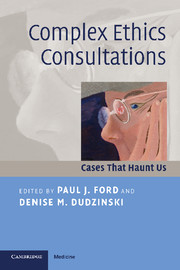Book contents
- Frontmatter
- Contents
- List of contributors
- Foreword
- Acknowledgments
- Introduction: Live and learn: courage, honesty, and vulnerability
- Part I Starting at the beginning: prenatal and neonatal issues
- Part II The most vulnerable of us: pediatrics
- Part III Diversity of desires and limits of liberty: psychiatric and psychological issues
- Part IV Withholding therapy with a twist
- Part V The unspeakable/unassailable: religious and cultural beliefs
- Part VI Human guinea pigs and miracles: clinical innovations and unorthodox treatment
- 21 Amputate my arm, please. I don't want it anymore
- 22 Feuding surrogates, herbal therapies, and a dying patient
- 23 One way out: destination therapy by default
- 24 Altruistic organ donation: Credible? Acceptable?
- Part VII The big picture: organizational issues
- Conclusions, educational activities, and references
- Index
24 - Altruistic organ donation: Credible? Acceptable?
Published online by Cambridge University Press: 03 May 2010
- Frontmatter
- Contents
- List of contributors
- Foreword
- Acknowledgments
- Introduction: Live and learn: courage, honesty, and vulnerability
- Part I Starting at the beginning: prenatal and neonatal issues
- Part II The most vulnerable of us: pediatrics
- Part III Diversity of desires and limits of liberty: psychiatric and psychological issues
- Part IV Withholding therapy with a twist
- Part V The unspeakable/unassailable: religious and cultural beliefs
- Part VI Human guinea pigs and miracles: clinical innovations and unorthodox treatment
- 21 Amputate my arm, please. I don't want it anymore
- 22 Feuding surrogates, herbal therapies, and a dying patient
- 23 One way out: destination therapy by default
- 24 Altruistic organ donation: Credible? Acceptable?
- Part VII The big picture: organizational issues
- Conclusions, educational activities, and references
- Index
Summary
Case narrative
Mrs. Alberta “Allie” Truistic, a married mother of a 10-year-old and a 12-year-old, offered to donate a kidney to any patient with end-stage kidney disease who could benefit from transplantation. Having been refused by three transplant programs, she presented to a fourth in 1996. A thoughtful transplant surgeon in our university program asked me, a nephrologist and clinical ethicist, what he should do. I recommended he undertake a study of altruistic, nondirected, unrelated renal transplant donation and consult the institutional review board (i.e., the human subjects research committee). He preferred to consult with the medical ethics committee of which I was vice chairman. The committee of 15 physicians, 8 nurses, 5 hospital administrators, 4 community representatives, 3 social workers, 3 bioethicists, and 2 attorneys performed ethics consultation either with a small team of four individuals or with the committee as a whole, as in this case.
The transplant surgeon told the committee that Allie Truistic had been motivated to donate ever since the death of her grandmother from polycystic kidney disease. She was told her grandmother, who had been on dialysis for several years, would have lived had she received a kidney transplant. Mrs. Truistic attended a meeting of our ethics committee and informed us that her husband and children supported her wish to donate. Concerned that detailed questioning by the 28 members of our committee might be intimidating, the transplant surgeon and two committee members (including the author) interviewed the patient. She was committed to donate and had a thorough understanding of the risks.
- Type
- Chapter
- Information
- Complex Ethics ConsultationsCases that Haunt Us, pp. 186 - 194Publisher: Cambridge University PressPrint publication year: 2008

